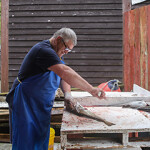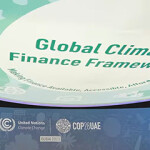India seeks transition period as WTO talks close in on deal to end harmful subsidies

A last-minute push by India for a quarter-century transition period complicated the final lap of ministerial talks to clinch a World Trade Organization deal on ending harmful fisheries subsidies on Wednesday, 15 June.
Indian Commerce Minister Shri Piyush Goyal said a 25-year transition period was a "must-have" in any deal in order to protect “low-income” Indian fishermen.
A text submitted to ministers meeting at the WTO by the chair of the negotiations, Santiago Wills, advances the process – the first such progress since the previous draft agreement was submitted 24 November, 2021, at which time negotiations were postponed due to a COVID-19 surge.
At the current WTO talks, negotiators discussed “territoriality,” or jurisdiction over disputed or overlapping territorial claims, as well as limiting subsidies for vessels using flags of convenience.
Wills said in a statement there were “clearer provisions” and better understanding among members on how the proposed rules allowing for special and differential treatment for certain vessels and types of fishing would work.
Roberto C. Alonso, the secretary general of Spanish fishery association ANFACO CECOPESCA, said he was more hopeful for a deal following a recent move by two key fishing regions in China to impose new sustainability-linked restrictions on their local fleets. Leaders in the provinces of Fujian and Shandong recently announced they will scrap fuel subsidies in favor of payments linked to compliance with fishery laws and conservation goals, though the provisions don’t apply to their distant-water fleets. Alonso told SeafoodSource the move could reveal a willingness from China to agree to a deal limiting fuel subsidies nationally.
Alonso said his organization wants any WTO deal on subsidies to be restrictive of artisanal fleets, which have been the focus of demands for opt-outs at the talks.
“The fishing industry is very diverse, with different industrial vessels depending on the country, and there are also artisanal vessels, all of which are capable of overfishing a fishing ground if they are poorly managed,” Alonso said.
European companies want international agreements that “are effectively applicable in a harmonized way, and take into account the different local cases,” Alonso said.
Other significant issues standing in the way of a deal include the details of the special and differential treatment provisions, such as determining the length of any potential transition period or eligibility for opt-outs for developing countries. Those may take more time to resolve, according to Isabel Jarrett, manager of the reducing harmful fisheries subsidies program at The Pew Charitable Trusts.
Jarrett told SeafoodSource she was “cautiously optimistic that WTO members will set aside their political differences,” saying she was encouraged by the positive momentum she has observed in recent days during the negotiations.
Photo courtesy of WikiMedia Commons





Share